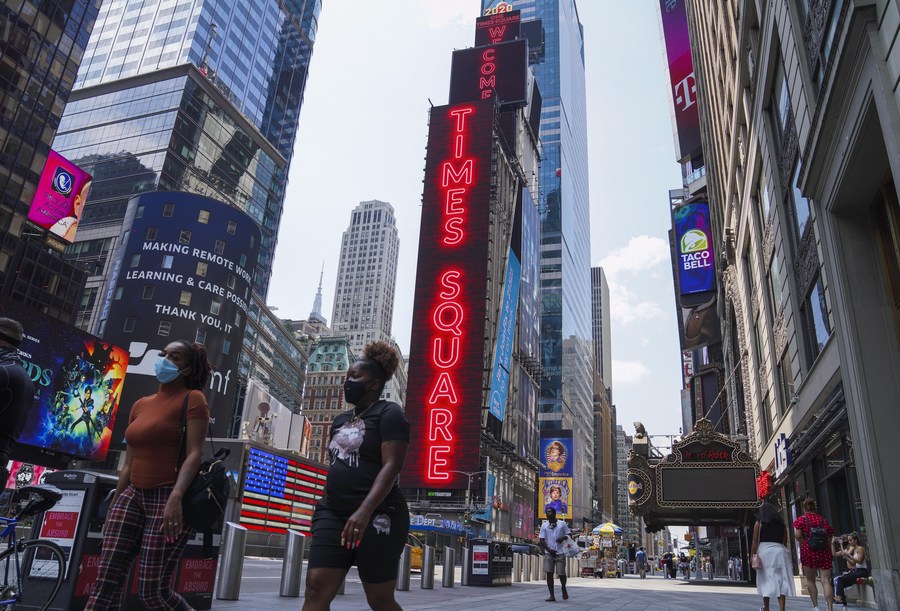US economic recovery at risk as Trump's executive orders fall short of what's needed
 0 Comment(s)
0 Comment(s) Print
Print E-mail Xinhua, August 14, 2020
E-mail Xinhua, August 14, 2020

U.S. economic recovery is facing significant risks as Congress remains deadlocked over the COVID-19 relief bill and President Donald Trump's recent executive orders fall well short of what is needed to boost recovery, economists said.
As negotiations between Republican and Democratic lawmakers stalled over the new relief bill, Trump on Saturday bypassed Congress to sign four executive orders to extend certain pandemic relief.
These orders included extending extra unemployment benefits through the end of the year at a reduced level of 400 U.S. dollars per week, instead of the 600 dollars approved by Congress in late March.
The other three actions Trump signed include a memorandum to defer certain payroll tax obligations, a memorandum to defer student loan payments and an executive order to reinstate the federal moratorium on evictions.
"A closer look at these orders suggests they will have at best marginal economic benefits even if fully implemented, which is questionable given the legality of the orders and the likely court challenges," Mark Zandi, chief economist of Moody's Analytics, wrote in an analysis earlier this week.
Zandi estimated that these orders could provide just over 400 billion dollars in total relief, but the U.S. economy needs a fiscal aid package costing at least 1.5 trillion dollars to avoid falling back into recession, based on simulations of Moody's macroeconomic model.
"The gap between what the president has ordered -- if fully implemented -- and what is needed, and that even the Trump administration acknowledges can't be met without an act of Congress, includes substantial federal aid to state and local governments to fill in their budget holes," he said.
Tim Duy, professor of the University of Oregon, said that the only potentially meaningful part of these executive orders is extension of unemployment benefits, but it "has a limited lifespan and may never really get off the ground."
"For the moment at least we need to recognize that the economy has lost a key part of support and still faces a dire need for state and local aid," Duy wrote Monday in a blog post.
After rebounding strongly in May and June, U.S. economic activity began to slow in July as some states paused their reopening plans or re-imposed restrictions on some activities due to the resurgence of COVID-19 cases.
"The resurgence in COVID-19 cases and subsequent pullback in activity have already begun. Delays to aid by Congress will exacerbate the slowdown in August," said Diane Swonk, chief economist at Grant Thornton, a major accounting firm.
"After that, much depends on our ability to ramp up testing, tracking, social distancing and masking to dampen the blow of a second wave. If we don't stop the freight train of infections, the economy will crash again," she said.
The impasse in Congress over the renewal of the expiring programs that mitigated the economic impact of the pandemic threatens to undo the stimulus effect of the programs and exacerbate the economic damage from the lockdown, according to a study released by the Peterson Institute for International Economics on Wednesday.
"U.S. policymakers should at least maintain the earlier levels of income support to prevent further induced economic damage. In the current depressed state of the economy, destimulation is a very poor policy choice," the study said.
Eric Rosengren, president of the Federal Reserve Bank of Boston, on Wednesday also warned that limited or inconsistent efforts by U.S. states to contain the pandemic will likely prolong the economic recession.
"Limited or inconsistent efforts by states to control the virus based on public health guidance are not only placing citizens at unnecessary risk of severe illness and possible death -- but are also likely to prolong the economic downturn," he said.
"As long as the virus poses significant threats to public health, a full economic recovery will be very difficult as individuals, often voluntarily, avoid activities that place their health at risk," said the Fed official.
The number of COVID-19 cases in the United States topped 5.24 million as of Thursday afternoon with more than 166,000 deaths, according to a tally by Johns Hopkins University.






Go to Forum >>0 Comment(s)